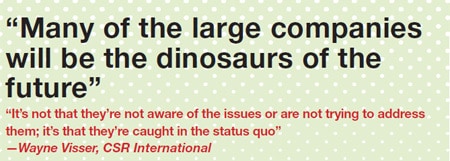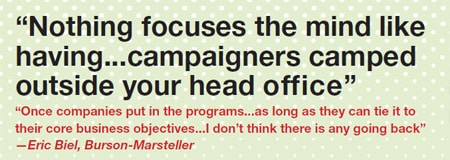COVER STORY: CORE VALUES
Companies at the cutting edge of corporate responsibility are weaving their citizenship efforts into the strategic heart of the business.
By Dan Keeler
 In the decade or so since the phrase “corporate social responsibility” first began to make its way into the mainstream corporate lexicon, the concept has gained widespread support and acceptance in the business world. In fact, the formal adoption of CSR policies has become so widespread that, among larger companies at least, it is almost universal. Adam Greene, vice president for labor affairs and corporate responsibility at the United States Council for International Business (USCIB), a business promotion group that counts most of the biggest US companies among its members, believes the majority of large companies feel like they are responsible corporate citizens. “For the most part, most US companies have got the CSR policies and systems in place,” he says. “That’s not to say nothing will ever go wrong, but they’re covered in terms of the main issues they’re trying to track.”
In the decade or so since the phrase “corporate social responsibility” first began to make its way into the mainstream corporate lexicon, the concept has gained widespread support and acceptance in the business world. In fact, the formal adoption of CSR policies has become so widespread that, among larger companies at least, it is almost universal. Adam Greene, vice president for labor affairs and corporate responsibility at the United States Council for International Business (USCIB), a business promotion group that counts most of the biggest US companies among its members, believes the majority of large companies feel like they are responsible corporate citizens. “For the most part, most US companies have got the CSR policies and systems in place,” he says. “That’s not to say nothing will ever go wrong, but they’re covered in terms of the main issues they’re trying to track.”
There is no doubt that the corporate world is mostly aware of—if not entirely convinced about—the importance of social responsibility. But while the vast majority of the biggest companies may have CSR policies or departments in place, their effectiveness and strategic influence within the business is often questionable. Part of the problem is that CSR, even now, is far too rarely considered a strategically important element of a business. Laura Herman, a managing director at CSR consultant FSG Social Impact Advisors, says that in a surprisingly large number of companies the CSR department still does not have direct access to the top-level decision makers. “It’s a challenge getting top leadership to embrace CSR,” she says. “It’s still seen as taking a risk—although really it’s a risk not to embrace it.”
According to Herman, many senior executives still have only a rudimentary understanding of the purpose and promise of CSR. “Unfortunately, the CSR function is often not a function that speaks directly to the C-suite,” she says. “The people in these departments may have great business or strategic ideas, but the people at the top may not be open to hearing them because they don’t perceive the CSR function as generating business ideas.”
Often it is only after a company ends up on the sharp end of a consumer or pressure group campaign that its leaders recognize the strategic importance of corporate citizenship. As a result, many of the leaders in the CSR field are those companies that have been most badly mauled by NGO (non-governmental organization) or consumer-led campaigns against them in the past. “Nothing focuses the mind like having a bunch of campaigners camped outside your head office,” says Eric Biel, managing director for corporate responsibility at global public relations firm Burson-Marsteller. It is no surprise, then, that some of the organizations most vilified over the years by human rights and environmental campaigners—companies such as Wal-Mart and Nike—have become enthusiastic cheerleaders for CSR.
Biel says companies that have “had their feet held to the fire” are extremely likely to continue building on their CSR efforts even after the pressure is off. “Once companies put in the programs and commit the resources—not just on human rights but sustainability—as long as they can tie it to their core business objectives and it’s something that can be demonstrated to be good for the bottom line, I don’t think there is any going back,” he says. “In fact, a lot of those companies bring some of their critics inside the tent.” US clothing retailer Gap, for example, gives critics space in the company’s sustainability report to discuss the company’s progress, while Wal-Mart has brought activists into its head office to help guide its environmental policies, Biel adds.
Mapping a New Path
Whatever their motivation, companies such as these are beginning to map out a new form of CSR, one where companies are no longer just wrapping environmental or social policies around their businesses but are embedding them deeply in their core operations—so deeply, in some cases, that corporate responsibility may eventually cease to be a separate, discernible function and become simply part of the way the company does business.

When start-up businesses adopt this new approach, they tend to be known as social enterprises, businesses whose mission is to create positive social or environmental change while also making a tidy profit. Bigger companies that want to move to a similar model, though, face some daunting challenges, says Wayne Visser, founder and director of UK-based consultancy CSR International. “Many of the large companies will be the dinosaurs of the future. It’s not that they’re not aware of the issues or are not trying to address them; it’s that they’re caught in the status quo,” he says. The big companies have so much invested in the existing patterns of business that they’re unable to really transform the market, he asserts.
 |
|
Flaherty: “CSR is a tremendous motivator for our people” |
Visser also claims the nature of CSR needs to change fundamentally. In his coming book, The Age of Responsibility, he argues that the first phase of CSR’s development, based heavily on philanthropy and public relations, is giving way to “a more interactive, stakeholder-driven model,” which he dubs CSR 2.0. “The exciting companies that are changing the business model are those whose products and services are more part of the solution than the problem,” Visser says. “Most of the multinationals have come a long, long way; they do embed CSR in a number of ways. But I’m still not sure they’re addressing it in their core business. They’re not really getting to the root of the unsustainability of our society, and they’re not questioning the growth in consumption-based and shareholder-driven capitalism,” he says.
It is perhaps indicative of the level of the challenges the big, established companies are facing that many of the businesses that are often cited as being at the cutting edge of CSR are not familiar household names but new enterprises, often using new technology to help provide services to vast numbers of underserved people in emerging markets. Visser cites as a prime example A Little World, an Indian company that is using mobile phone technology to create microbanks in rural India, enabling huge numbers of people to gain access to reliable financial services. “It’s inspiring because it’s an inclusive business,” he says. CSR 2.0 is far from the preserve of the smaller operators, though. Visser is equally impressed by the UK phone giant Vodafone’s Kenya-based M-Pesa operation, which enables money transfers via text message, giving potentially millions of people access to fast, cheap money-transfer services.
The Power To Change
 |
|
Chandra: Work with NGOs in Africa will benefit both locals and Barclays |
It may be difficult for existing multinationals to integrate the principles of corporate responsibility into their existing core business models, but that is not stopping them from trying. Banking giant Citi is one company that is working to make CSR intrinsic to its operations. “We have very few CSR staff, so we may already be there,” says Pam Flaherty, Citi’s director of corporate citizenship and president/CEO of the Citi Foundation. “For us, it’s not just about bringing CSR into the strategic part of the business; it’s having our business colleagues feel that they have a leadership role and an opportunity to figure out how they can make a positive difference.”
Helping to promote this seamless interplay between corporations’ and society’s needs are consultants such as FSG, which is helping companies focus their philanthropic efforts in areas that will also bring strategic benefits to the business. Herman says the consultant focuses on the concept of “shared value,” where both the company and society as a whole benefit from a company’s social development efforts. “We’re looking at new business models that will serve society,” she says. “Your business creates a new profit center, or gains access to new markets, but you’re also doing something that enables the whole population to benefit.”
Sunny Misser, CEO of global corporate responsibility research and advisory services firm AccountAbility, says sustainability initiatives can help companies break into new markets. “Sustainability challenges can be used to develop innovative solutions and create significant new markets,” Misser says. “For example, future protection of forests will require financing of approximately $90 billion per year. This will create a new market for companies in monitoring, assurance, project management, adaptation, communications and so on,” he adds.

As a prime example of shared value at work, Herman cites Nestlé’s efforts to help small-scale dairy farmers in India become more commercially viable. The farmers benefit by becoming more efficient and gaining access to a much bigger market, and Nestlé gains by increasing its potential supplier base and improving the quality of the suppliers’ products.
Points of Principle
A common factor among those companies at the cutting edge of CSR is a belief that becoming a consciously responsible company is no longer optional; it’s essential. Reiner Hengstmann, global head of social and environmental affairs at sporting goods company Puma, epitomizes this attitude when he says: “We have decided that, in terms of sustainability, CSR is no longer just nice to have; it is a ‘must’ have. Puma decided to make it a core of the business. More and more companies are moving in this direction, making CSR the core of business decisions.”
As part of its determination to be a socially responsible company, Puma has committed to being “fair, honest, positive and creative” in all its operations. “In any kind of business decision we make, we have to ask ourselves if we are acting according to those four principles,” says Hengstmann. Misser says AccountAbility applies a similar filter when advising clients on how to craft their sustainable business strategies or CSR plans. He has dubbed AccountAbility’s system “visa,” which stands for visibility, impact, sustainability and alignment. The last characteristic—alignment—is often cited by CSR professionals as essential to a project’s success. Indeed, in many cases, says Misser, when a CSR program fails to achieve its aims, it is because its goals were not aligned with the mission of the business.
Britain’s Barclays Bank is clearly illustrating the benefits of alignment. Through a partnership with two NGOs, the bank is helping set up village-based savings-and-loan organizations that will ultimately become self-sustaining, enabling local communities access to basic financial services. “About 80% of people in Africa do not have bank accounts,” says Vinit Chandra, CEO of Barclays Africa. “This provides a huge challenge and, at the same time, an opportunity for banks in Africa. Our work in financial inclusion is a clear demonstration of an activity that has positive social impacts, fits with our core business expertise and offers possible future income-generation for all.”
Herman at FSG says that companies’ aligning their charitable efforts with their business goals is at the core of the new generation of CSR programs—and that both the businesses and the charities stand to gain from this approach. “You get a lot more bang for your buck when you make these decisions with a better sense of alignment,” she says. “When you choose issues to work on that you can tackle from a really authentic point of view, you develop something we call ‘authentic engagement,'” she adds. “We think companies will be most authentic when they find issues that are relevant to their business. Then they can be involved for the long term.”
 |
|
Local benefits: US food manufacturer General Mills is helping people such as this woman in Malawi establish businesses that will raise their standard of living |
Citi reflects that approach with a project it announced in early May. “One of the areas we’re focusing on is the economic recovery in the US,” says Flaherty. “We’re setting up a $200 million fund to spur small businesses lending in low-income communities.” Citi is working with a pair of NGOs to help fund organizations that provide loans. “Through them, we’re hoping to spur lending to very small businesses we might otherwise not be able to reach,” Flaherty comments. While the $200 million fund might look like a simple charitable effort, it is more than that for Citi: “Is this charity? No, this is a business deal!” she says.
By clearly aligning their efforts to make a positive difference with their own business goals, companies such as Citi are also setting the stage for long-term involvement in those communities, which is something NGOs often complain is lacking in companies’ CSR efforts. Herman says long-term commitment to a project is one of the most valuable things a company can provide an NGO. If they know they will have a steady and reliable commitment from a corporate donor, an NGO can become far more effective because it can create its own long-term plans. But authentic engagement is not just about cash, Herman adds: “It’s about giving more than just money; companies can bring actual business, product design or regulatory expertise.”
 |
|
Double savings: Green buildings such as Citi’s new data center cut both costs and emissions |
US food manufacturer General Mills is putting those principles into practice at its Chinese operation. “In China we contract with local village farmers to grow corn for the Bugles that we produce for Chinese consumers,” says Camie Donohue, director of corporate social responsibility at General Mills. “We provide the seed, the fertilizer and agronomic guidance, and we promise to buy their entire crop, so we secure quality ingredients but we’re also elevating the farmers that provide them at the same time.”
The company is also working with NGOs and governments in Africa to transfer technology and expertise in food safety and food manufacturing to small and medium-size enterprises. “We help them transform raw materials into value-added products that will sustain the community, create sustainable income and improve lives,” says Donohue.
The Standards Issue
As the philosophy and practice of CSR becomes more businesslike and less nebulous, the lack of standards against which companies’ performance can be measured is becoming a cause for concern. Companies at the cutting edge of CSR tend to set themselves ambitious targets and commit the resources necessary to reach them, but while their determination to keep improving their record is laudable, critics are concerned that because the targets are self-imposed they are often arbitrary and difficult to compare from one company to another. Creating universal citizenship standards, they argue, would help investors, customers, regulators and the companies themselves assess their performance on an absolute and a relative level.
Biel believes the pressure to set independent standards is growing. “More and more, everyone in the CSR space is recognizing the need for better metrics for measuring their impact on local communities. There is a clear emphasis on improving reporting on social impact,” he says.
Whether that will lead to industry-wide or global standards is a hotly debated issue, however, and many corporations are lukewarm on the idea. Donohue at General Mills says: “Standardization is important in that it provides for clear communication and accountability, and we’d be hard-pressed not to be in support of that, but as for what the specific numbers are, it’s very difficult to say.” Citi’s Flaherty has a similar view: “It is productive that there are discussions about standardizing the metrics, although I am not convinced we will get to that point because every company is different. I’m not sure that one size fits all.”
Misser agrees: “Global standards cannot be the only solution. They are difficult to set and harder to implement and enforce. They need to balance the prescriptive and specific with the principles and values that guide behavior.”
Demands on Suppliers
Just as important as companies’ attempts to conform to high environmental and social standards in their own operations are their efforts to ensure their suppliers are maintaining the same standards. “It’s not just your own operations; you have to be able to identify the impact you’re having across your supply chain,” says Biel. Unfortunately, this does not involve simply setting standards and writing them into the suppliers’ contracts. In most cases, it involves frequent monitoring, a time-consuming, costly and sometimes near-impossible task. Indeed, one major global consultancy sold its supplier audit business in China because it deemed the operation too risky. The consultant was simply unable to reliably assess the performance of the suppliers it was supposed to be auditing.
According to Greene at USCIB, much of the blame for the difficulty in ensuring high standards, particularly in terms of working conditions, lies with the governments of the countries in which multinationals are operating. Those governments, says Greene, are relying on the companies themselves to enforce the country’s national laws, which takes a great deal of effort on the part of the international companies. “You can’t have effective implementation of law through the supply chain. We really need governments to step in,” he says. “If the governments of those countries had effective labor inspection programs that held people to account in terms of their compliance with [local] labor laws, the companies would then be able to focus on working with those factories to do things better in other ways,” he adds.
Biel says that many companies have made significant progress in improving the working conditions of their suppliers’ employees but agrees with Greene that the companies’ efforts are often hindered by a lack of support from the governments in the countries from which they source their raw materials. “Even with their economic influence, it’s not clear how much these companies can impact conditions if the government isn’t committed to improving conditions for their own people,” Biel comments.
People Power
 |
|
Disaster: BP struggles to contain one of the worst oil spills ever |
As more companies leap on the corporate citizenship bandwagon, it can create a virtuous circle: Every company that commits to improving its record adds more competitive pressure and peer pressure on those that remain on the sidelines. And companies are far more likely to establish an environmental policy if winning or losing a piece of business is dependent upon it.
Competition for talented staff is also a decisive factor in persuading companies to adopt a more responsible attitude. “CSR is a tremendous motivator for our people,” says Citi’s Flaherty. “When people can use their own skills and they can see the business making a positive difference, it’s very inspiring and it helps us attract and retain the best people.” Her views are echoed by AccountAbility’s Misser, who says many talented graduates will refuse to work for a company unless it can demonstrate its citizenship credentials. Biel adds that potential recruits are “making their decisions on where they’re going to work based on whether it’s a socially responsible company. That’s another place it hits companies in the pocketbook—if they can’t recruit or retain the best talent in this generation,” he says. A spokesperson for global consultant Accenture adds, “People increasingly choose an employer with the company’s corporate citizenship reputation in mind.”
Are They For Real Yet?
In many companies, CSR has undergone a remarkable transformation from peripheral concern to key business issue. But one thing that has not changed even slightly over the past decade is the question, Are they for real? The suspicion that many corporations’ CSR efforts are really papering over the cracks—or are simply greenwash—is as strong as ever, and perhaps more so now that companies know all the tricks to present themselves as responsible corporate citizens. With PR firms and consultants making a comfortable living from their CSR consultancy services, cynics would be forgiven for thinking that the emphasis is more on looking good than being good.
British energy giant BP is a case in point. Over the past decade it has made a concerted effort to present itself as a company that cares as much about the environment as about profits, and yet, as Global Finance was going to press, it was still trying to head off what could become one of the world’s worst-ever environmental disasters. When a company that rebranded itself as “Beyond Petroleum” is responsible for one of the biggest oil spills in history, critics of corporate greenwash will justifiably have a field day. And it is hard to argue with those who suggest the millions BP splashed out to publicize its CSR credentials would have been better spent designing safer oil rigs.
“There is plenty of greenwashing going on,” admits Biel, “although I think the most egregious examples are from companies that did not get good external advice and tried to do something on the cheap and pull the wool over people’s eyes,” he says. “But in this new media environment with blogs, one-person investigative reporting shops and so on, if they are not in a position to support what they’re doing with real evidence and metrics, they’ll be exposed before they know it.”
Biel believes that the majority of companies that approach his firm genuinely want to become better corporate citizens. “The people coming to us are not saying, ‘Give us a communications strategy so we won’t have to measure our carbon footprint,'” he says. “Far more often, people say, ‘We know we have to step up. Help us reach out to NGOs, media and socially responsible investment funds so we can tell them our story.'”
As both the CSR industry and the corporations and NGOs it serves develop an ever-deeper understanding of the importance of integrating corporate citizenship into the heart of corporations, those stories should get more and more inspiring.



